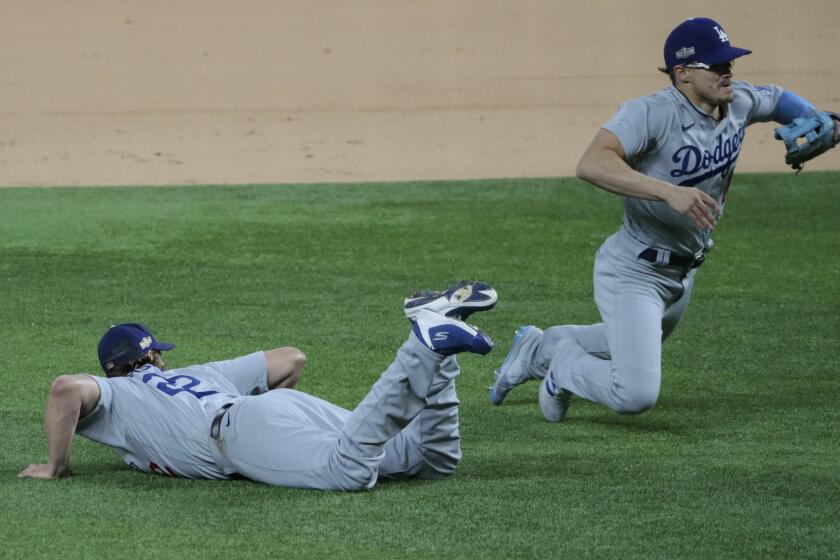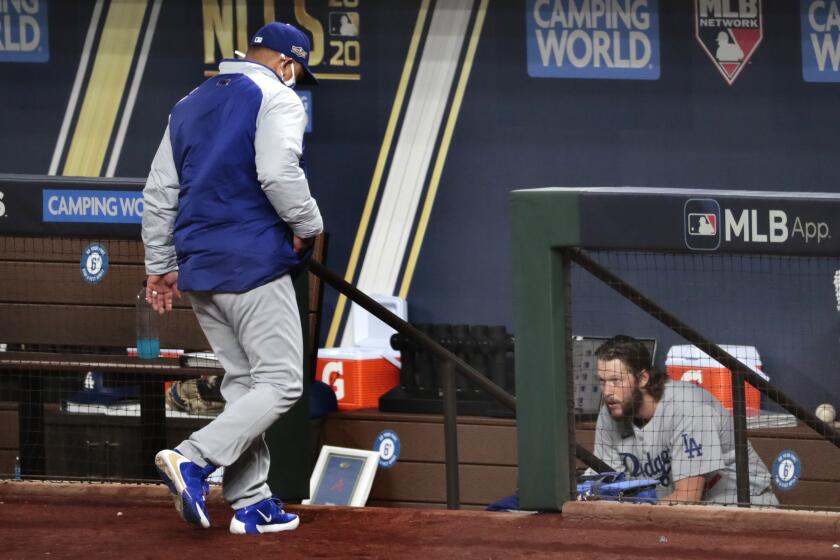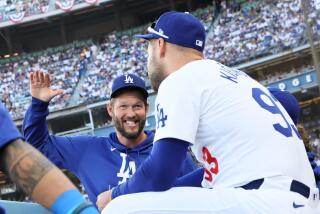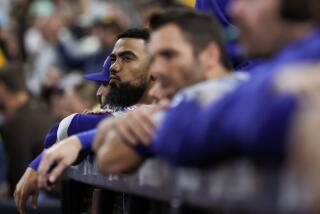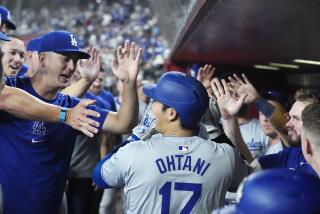Column: Dodgers’ October nightmare is once again staring them in the face
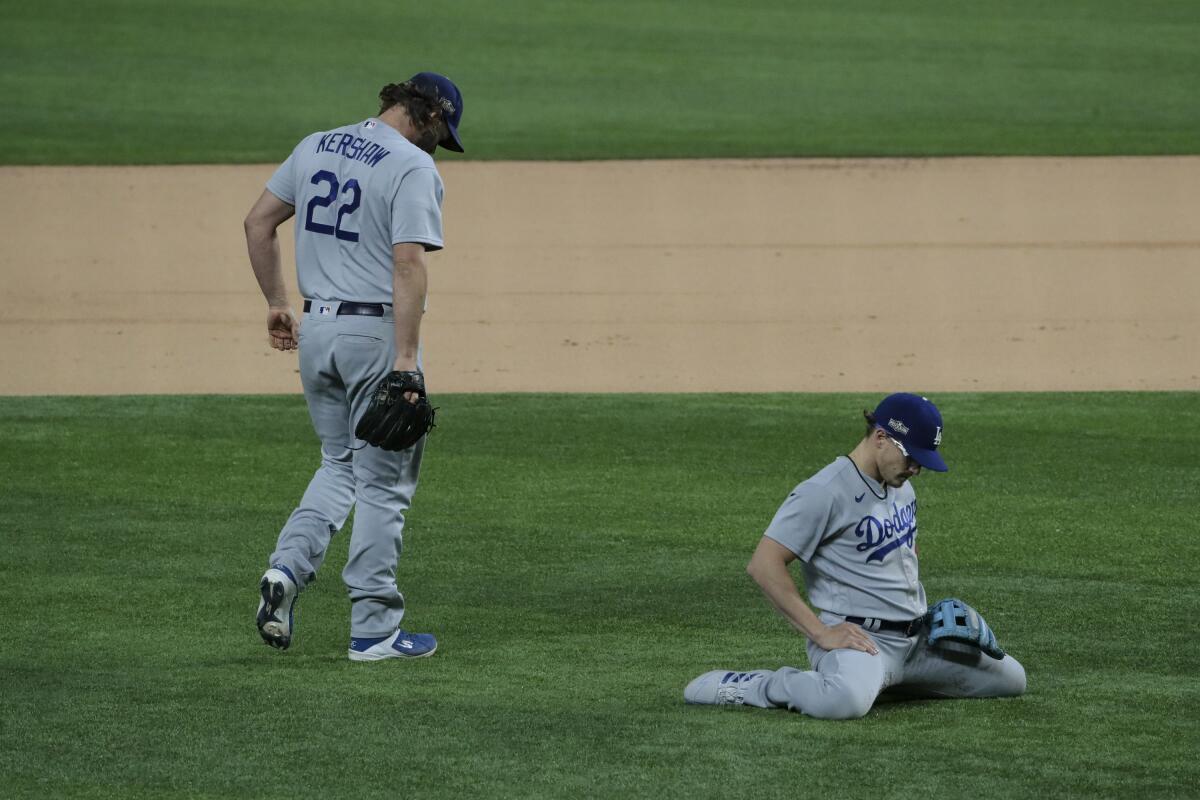
- Share via
Horror of horrors, it’s happening again.
Clayton Kershaw is trudging off the mound with his head hanging, again.
Dave Roberts is staring into space with his eyes flaring, again.
The Dodgers offense is flailing carelessly into the winter, again.
Again, again, again, the Dodgers are blowing October.
A season that was supposed to be different skidded toward a familiar ditch Thursday with the same unbearable screeching that Dodger fans have endured for eight years.
This time it was the Atlanta Braves, this time it was the National League Championship Series, but this time it was like every other time.
The Dodgers are routed by the Atlanta Braves 10-2 in Game 4 of the NLCS and are one loss away from being eliminated from the postseason.
The Dodgers, with momentum on their side and Kershaw on their mound, watched both slip away in a defining postseason loss to a clearly undermanned opponent.
The Braves won Game 4, 10-2, to take a seemingly insurmountable three-games-to-one lead in a series that looks so familiar because it shouldn’t be looking like this.
On a windy night at Globe Life Field in Arlington, Texas, the Dodgers were coming off a 15-3 Game 3 victory and had their future Hall of Famer facing somebody named Bryse Wilson, a 22-year-old kid who had pitched in 15 big league games.
It felt like a lock. It turned out to be a mess. The Dodgers offense lost its mind in impatiently hacking out one hit in six innings against the rookie.
Kershaw lost his grip after five strong innings, allowed hits to the first three batters in the sixth, and finished with another fall failure.
Roberts lost his bearings by leaving Kershaw in the game one batter too long in that sixth, and where have you heard that before?
This may have been Atlanta in 2020, but the combined failures echoed through Washington in 2019, Boston in 2018, Houston in 2017, the Chicago Cubs in 2016, the New York Mets in 2015, and St. Louis in 2014 and 2013.
This has happened so much, to expect something different is the definition of insanity, which describes what it feels like to keep believing in these guys.

There are potentially three more games in this best-of-seven series, but the Dodgers must win all three against a team that has already beaten their best pitchers and shut down their best hitters. One night after seemingly gaining control, the Dodgers are suddenly looking like a lost cause. The fate of the season rests in the right arm of Dustin May, who will start Game 5 on Friday night against a bunch of Braves pitchers who have been tons of tough.
And, by the way, in all of baseball history, teams trailing three games to one have won but 13 times in 87 series.
“They still have to beat us another time, and I still believe in everyone in that clubhouse,” said Roberts.
Yet on the 32nd anniversary of Kirk Gibson’s World Series home run, this wasn’t a game, it was blasphemy.
Start with the league-best offense, whose trademark this season was to patiently wear down pitchers before smothering them. Not this time. Not even against seemingly the most vulnerable of arms.
In the first inning, Mookie Betts swung at Wilson’s second pitch. So did Corey Seager. The kid needed just nine pitches to get out of the inning. It was the same with the second inning, only nine more pitches, and by the time the sixth inning ended Wilson had barely broken a sweat, throwing 74 pitches, giving up just an Edwin Rios home run.
The Dodgers boast first-rate analytics and a payroll most general managers would die for, and yet they are on the brink of another lost playoff run.
The same could not be ultimately said of Kershaw, who yielded just four hits over the first five innings but suddenly found himself stumbling under pressure in the sixth.
With the score tied 1-1, Ronald Acuña Jr. led off by reaching second on a chopper over Kershaw’s head that Kiké Hernández threw wildly to first. Then Freddie Freeman stroked an RBI double into deep right field to give the Braves the lead.
Then up stepped Marcell Ozuna, who had hit the ball hard against Kershaw in two previous at-bats, including hammering a long home run in the fourth. Kershaw had thrown 81 pitches. It seemed a perfect time to lift him.
Roberts disagreed.
“The inning prior . . . was a clean inning,” Roberts said. “I thought Clayton was throwing the ball well and there was no reason. I felt really good about it.”
Kershaw stayed. Ozuna whaled. He worked the count full and powered a line drive into left-center field to score another run, forcing Kershaw to the dugout while opening the floodgates.
Afterward, Kershaw was asked a question he has been asked a million different times over the last eight Octobers — what was he trying to do with the hitter that beat him?
“Get him out,” he said wearily.
The Braves scored six runs that inning after the appearance of rookie relievers Brusdar Graterol and Victor González, and Kershaw wound up being charged with three of them, four overall.
“Yeah, it’s a tough way to go in that sixth inning, for sure,” said Kershaw, and how many times has he said that? Kershaw now has a 4.31 postseason ERA in comparison to a 2.43 regular season ERA, and even though he wasn’t completely to blame Thursday, that disparity will continue to haunt.
“That narrative couldn’t be further from the truth,” Roberts said. But it is the truth, just like the Dodgers’ postseason failings continue to be a somber reality on a night when the best team in baseball was the worst team in October.
Again.
Plaschke reported from Los Angeles.
More to Read
Are you a true-blue fan?
Get our Dodgers Dugout newsletter for insights, news and much more.
You may occasionally receive promotional content from the Los Angeles Times.

